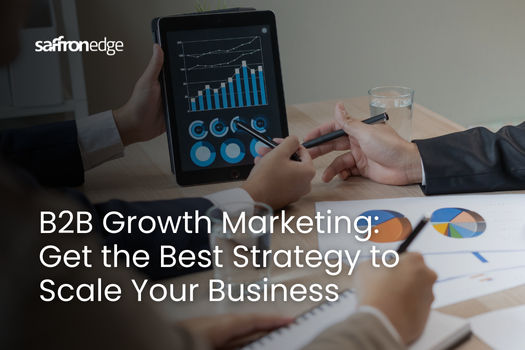Contents
Are you struggling to generate high-quality leads for your B2B business? Do your marketing campaigns attract attention but fail to convert into long-term clients? Are you looking for data-driven strategies to fuel sustainable growth?
Business-to-business (B2B) companies face unique challenges in achieving sustainable growth. Unlike Business-to-Consumer (B2C) models, B2B transactions often involve longer sales cycles, multiple decision-makers, and complex value propositions.
According to HubSpot, 61% of marketers say generating traffic and leads is their top challenge.
To navigate this complex environment, B2B growth marketing emerges as a pivotal strategy. This comprehensive approach focuses on data-driven decision-making, customer-centric tactics, and continuous optimization to drive revenue and promote long-term relationships.
What is B2B Growth Marketing?
B2B growth marketing is a holistic strategy that emphasizes increasing revenue through the acquisition and retention of business clients.
It leverages data from continuous testing and market insights to optimize campaigns, ensuring marketing efforts resonate with target audiences and drive measurable results.
By engaging customers at every stage of the marketing funnel, growth marketing transforms prospects into loyal advocates, enhancing brand equity and market share.
Key Differences Between Growth Marketing and Traditional Marketing
While traditional marketing often relies on broad-reach tactics and intuition, growth marketing is distinguished by its:
| Aspect | Growth Marketing | Traditional Marketing |
|---|---|---|
| Focus | Long-term, sustainable business growth with a strong focus on retention and referrals | Primarily focused on short-term brand awareness and customer acquisition |
| Approach | Data-driven, iterative, and highly experimental | Fixed strategies with broad targeting, limited flexibility |
| Customer Journey | Covers the entire funnel (awareness, acquisition, retention, and advocacy) | Primarily focuses on customer acquisition, neglecting retention |
| Channels | Multi-channel, leveraging SEO, social media, paid ads, email, CRO, and automation | Mostly relies on TV, radio, print, and digital ads |
| Personalization | Highly personalized using data insights and segmentation | One-size-fits-all messaging with limited targeting |
| Testing & Optimization | Continuous A/B testing, experimentation, and data-backed iterations | Lacks A/B testing and experimentation, often set-and-forget campaigns |
| Impact on Revenue | Drives higher revenue by improving retention, LTV, and customer experience | Focuses on increasing sales volume but lacks long-term revenue impact |
| Metrics | LTV, CAC, engagement, retention, and conversion rates | Impressions, reach, and short-term ROI |
| Technology Use | Leverages AI, automation, data analytics, and growth hacking tools | Limited use of automation and advanced data insights |
| Scalability | Highly scalable and adaptable to market changes | Less adaptable, requires higher budgets for expansion |
| Goal | Sustainable growth through continuous learning, retention, and referrals | Immediate sales and brand awareness with limited long-term impact |
Core Components of a B2B Growth Marketing Strategy
A B2B growth marketing strategy involves market research, clear differentiation, multi-channel outreach, and sales-marketing alignment to attract and nurture leads.
Continuous data analysis and optimization ensure sustained growth and customer satisfaction.
Market Research and Audience Segmentation
-
Who Are Your Ideal Clients? Conduct in-depth research on industry trends, competitor strategies, and market demands to identify opportunities and threats.
-
What Are Their Pain Points? Develop detailed buyer personas that include decision-making processes and preferred communication channels.
Value Proposition and Differentiation
-
What Makes Your Solution Unique? Clearly articulate the unique selling points (USPs) that differentiate your products or services.
-
How Can You Solve Their Challenges? Focus on how your offerings address specific challenges faced by potential clients.
Multi-Channel Marketing and Outreach
-
What Content Engages Your Audience? Create valuable and relevant content, such as whitepapers, case studies, and blogs, to establish thought leadership.
-
Where Can You Reach Decision-Makers? Leverage platforms like LinkedIn, targeted email campaigns, and industry webinars to nurture leads effectively.
Sales and Marketing Alignment
-
Are Your Sales and Marketing Teams Working Together? Ensure collaborative planning with shared goals, metrics, and communication strategies.
-
How Do You Qualify and Nurture Leads? Implement lead scoring and automated nurturing sequences to efficiently guide prospects through the sales funnel.
Data Analytics and Continuous Optimization
-
What Are Your Key Performance Indicators (KPIs)? Monitor customer acquisition cost (CAC), lifetime value (LTV), and conversion rates.
-
How Can You Improve? Collect client feedback and analyze campaign performance to refine offerings and improve customer satisfaction.
Find Your B2B Growth Potential
Drive high-quality leads, increase conversions, and accelerate revenue with data-driven marketing strategies.
Difference in the Funnel: Growth Marketing vs. General Marketing
Growth marketing optimizes the entire customer journey, focusing on sustainable revenue and long-term customer relationships, while general marketing is more campaign-driven, focusing on initial acquisition.
| Funnel Stage | Growth Marketing | General Marketing |
|---|---|---|
| Awareness | Uses data-driven strategies like SEO, content marketing, and paid ads to attract the right audience | Focuses on broad campaigns through digital ads, PR, and branding efforts |
| Acquisition | Leverages A/B testing, behavioural data, and hyper-targeted campaigns to improve conversion rates | Uses standard ad targeting and lead generation without extensive experimentation |
| Activation | Personalizes onboarding nurtures leads with automation, and optimizes user experience | Relies on traditional lead nurturing methods without dynamic personalization |
| Retention | Engages users with automated email sequences, loyalty programs, and customer success strategies | Often focuses more on new customer acquisition than retention efforts |
| Revenue Growth | Focuses on increasing LTV with upselling, cross-selling, and personalized offers | Primarily tracks initial sales and short-term campaign ROI |
| Referral | Encourages organic growth through word-of-mouth, referral programs, and user advocacy | Rarely integrates structured referral programs into marketing strategy |
| Optimization | Continuously experiments with A/B testing, AI-driven insights, and real-time data adjustments | Optimizes campaigns based on historical data rather than ongoing real-time testing |
5 Effective B2B Growth Marketing Tactics
Implementing the right growth marketing tactics can significantly impact your business’s success.
Companies can enhance lead generation, conversion rates, and long-term client retention by strategically using data-driven approaches and customer engagement strategies.
Account-Based Marketing (ABM)
Account-based Marketing (ABM) is a highly targeted approach in which marketing efforts focus on key accounts rather than a broad audience. Companies can increase engagement and close deals faster by customizing content and outreach for specific businesses.
-
Are You Targeting the Right Accounts? To increase engagement and conversion rates, focus on high-value accounts and use personalized marketing efforts.
-
Is Your Content Customized? Develop tailored content that addresses each target account's specific needs and challenges.
Search Engine Optimization (SEO)
Search Engine Optimization is essential for making your business discoverable online. Optimizing content and website performance can significantly impact lead generation and brand visibility.
-
Are You Ranking for Industry-Specific Keywords? Identify and incorporate relevant keywords to improve search engine rankings and attract qualified traffic.
-
Is Your Website Technically Optimized? Ensure website speed, mobile responsiveness, and proper indexing for improved discoverability.
Paid Advertising
Paid ads provide immediate visibility and help businesses reach their target audience efficiently. Leveraging platforms like Google Ads and LinkedIn ensures a higher ROI on marketing investments.
-
Are Your Ads Targeted and Cost-Effective? Use pay-per-click (PPC) campaigns on Google Ads and LinkedIn to reach potential clients who are actively searching for solutions.
-
Are You Retargeting Interested Prospects? Implement retargeting ads to re-engage visitors who have previously interacted with your brand.
Webinars and Virtual Events
Webinars provide a powerful way to educate potential clients and establish thought leadership. These interactive sessions offer value while positioning your brand as an industry authority.
-
Are You Educating Your Audience? Host webinars to provide valuable insights, demonstrate expertise, and generate leads.
-
Are Your Events Interactive? Engage prospects through live Q&A sessions and virtual workshops to showcase your solutions.
Customer Referral Programs
A well-structured referral program can turn satisfied customers into your best marketing advocates. Offering incentives can boost referrals and bring in high-quality leads.
-
Do You Incentivize Customer Advocacy? Encourage satisfied clients to refer to new business through rewards or recognition programs.
-
Are You Showcasing Testimonials? Highlight positive feedback and case studies to build trust with potential clients.
Measuring Success in B2B Growth Marketing
Tracking the success of your B2B growth marketing strategy is essential for ensuring continuous improvement and ROI optimization.
By monitoring key performance indicators (KPIs), businesses can gain insights into what works and refine their strategies accordingly. Here are some crucial metrics to consider when measuring success.
What Metrics Matter?
-
Lead Generation: Tracking the number of qualified leads generated through various campaigns.
-
Conversion Rates: Measuring the percentage of leads that progress through each sales funnel stage to become customers.
-
Customer Retention: Monitoring repeat business and the longevity of client relationships.
How Can You Leverage Data Effectively?
-
Use CRM Systems to manage interactions with current and potential clients, and analyze data to improve business relationships.
-
Utilize Marketing Automation to streamline marketing efforts and measure campaign performance.
Future Trends in B2B Growth Marketing
B2B marketing is evolving with AI-driven personalization, chatbots, video content, and voice search optimization. Sustainability and CSR also play a key role in attracting ethical business partners.
AI and Predictive Analytics
Artificial intelligence (AI) and predictive analytics transform B2B marketing by enabling data-driven decision-making. AI algorithms analyze vast amounts of historical and real-time data to predict market trends, customer behaviours, and potential opportunities.
Businesses use these insights to personalize marketing campaigns at scale, ensuring that messages, product recommendations, and content are tailored to individual client needs.
This results in higher conversion rates, improved customer retention, and more efficient resource allocation.
Conversational Marketing and Chatbots
Conversational marketing leverages AI-powered chatbots and live messaging to enhance customer engagement. These tools provide real-time responses, guiding prospects through the buyer journey without requiring direct human intervention.
AI-driven chatbots can qualify leads, answer frequently asked questions, and even schedule sales calls, ensuring a seamless and responsive customer experience.
This approach helps businesses nurture relationships, improve response times, and drive conversions by meeting potential clients where they are.
Video and Interactive Content
The demand for engaging and dynamic content has led to the rise of video and interactive marketing strategies. Explainer videos, product demonstrations, and customer testimonials help simplify complex solutions and build credibility.
Live Q&A sessions and webinars provide opportunities for real-time engagement, allowing businesses to address customer concerns and showcase expertise directly.
Interactive content, such as polls, quizzes, and virtual demos, enhances user engagement and encourages deeper interaction with the brand.
Voice Search Optimization
As voice assistants like Siri, Alexa, and Google Assistant become more widely used, businesses adapt their content to optimize for voice search queries.
This involves using conversational language, answering common questions concisely, and focusing on long-tail keywords that match natural speech patterns.
Voice search optimization helps companies improve search rankings, increase discoverability, and cater to the growing number of professionals using voice-activated devices for research and decision-making.
Sustainability and Corporate Social Responsibility (CSR)
Modern businesses are placing greater emphasis on sustainability and ethical practices when selecting partners. Companies that highlight eco-friendly initiatives, responsible sourcing, and social impact projects can differentiate themselves in a crowded market.
Demonstrating a commitment to Corporate Social Responsibility (CSR) through transparent reporting, sustainable packaging, and green policies appeals to businesses prioritising ethical partnerships.
This enhances brand reputation and promotes trust and long-term client relationships.
Conclusion
B2B growth marketing is not a one-size-fits-all approach but a dynamic and adaptable strategy that evolves with market trends and customer needs.
Leveraging SEO, data-driven insights, and innovative engagement tactics can significantly enhance lead generation and conversion rates.
Companies like Saffron Edge, a leading SEO agency, specialize in optimizing digital strategies to help businesses improve their online visibility and achieve sustainable growth. B2B companies can stay ahead in an ever-evolving landscape by partnering with experts and continuously refining marketing efforts.
Get The Ultimate Marketing Toolkit
Frequently Asked Questions
What is the main goal of B2B growth marketing?
B2B growth marketing aims to drive sustainable business expansion by acquiring, retaining, and engaging high-value customers. It focuses on data-driven strategies to optimize marketing efforts, improve conversion rates, and maximize ROI.
How does B2B growth marketing differ from traditional marketing?
Unlike traditional marketing, which relies on broad outreach and brand awareness, B2B growth marketing emphasizes measurable results, customer journey optimization, and continuous testing. It integrates data analytics, multi-channel engagement, and personalization to enhance lead generation and customer retention.
What role does SEO play in B2B growth marketing?
SEO is crucial in B2B growth marketing as it improves a company’s online visibility and helps attract qualified leads. Businesses can enhance search rankings and drive organic traffic by optimizing website content, technical SEO, and targeting industry-specific keywords.
Why is account-based marketing (ABM) important in B2B marketing?
ABM is essential for B2B marketing because it focuses on high-value accounts rather than a broad audience. This targeted approach allows businesses to personalize marketing efforts, improve engagement with key decision-makers, and increase the likelihood of closing deals.
How can companies measure the success of their B2B growth marketing efforts?
Success in B2B growth marketing is measured through key performance indicators (KPIs) such as lead generation, conversion rates, customer retention, and return on investment (ROI). Utilizing CRM systems and marketing analytics tools helps businesses track performance and refine strategies for continuous improvement.
Go Beyond Acquisition—Drive Real Growth
Traditional marketing brings in customers, but growth marketing keeps them engaged and drives long-term revenue. Focus on the full funnel for lasting impact.
Related Blogs
We explore and publish the latest & most underrated content before it becomes a trend.
7 min read
6 Steps To Succeed With Marketing Intelligence For Your Company
By Vibhu Satpaul
Subscribe to Saffron Edge Newsletter!

Get The Ultimate Marketing Toolkit










